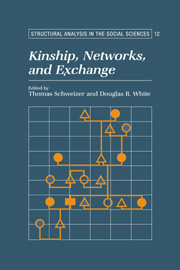Book contents
- Frontmatter
- Contents
- Preface
- List of contributors
- 1 Revitalizing the Study of Kinship and Exchange with Network Approaches
- I Representing Kinship Dynamics, Material Flow, and Economic Cooperation
- 2 The Grapevine Forest: Kinship, Status, and Wealth in a Mediterranean Community (Selo, Croatia)
- 3 Kinship, Property Transmission, and Stratification in Javanese Villages
- 4 Network Mediation of Exchange Structures: Ambilateral Sidedness and Property Flows in Pul Eliya (Sri Lanka)
- 5 Alliance, Exchange, and the Organization of Boat Corporations in Lamalera (E. Indonesia)
- II Individual Embeddedness and the Larger Structure of Kinship and Exchange Networks
- III Marriage, Exchange, and Alliance: Reconsidering Bridewealth and Dowry
- IV Emergence, Development, and Transformation of Kin-Based Exchange Systems
- Index
2 - The Grapevine Forest: Kinship, Status, and Wealth in a Mediterranean Community (Selo, Croatia)
Published online by Cambridge University Press: 05 November 2011
- Frontmatter
- Contents
- Preface
- List of contributors
- 1 Revitalizing the Study of Kinship and Exchange with Network Approaches
- I Representing Kinship Dynamics, Material Flow, and Economic Cooperation
- 2 The Grapevine Forest: Kinship, Status, and Wealth in a Mediterranean Community (Selo, Croatia)
- 3 Kinship, Property Transmission, and Stratification in Javanese Villages
- 4 Network Mediation of Exchange Structures: Ambilateral Sidedness and Property Flows in Pul Eliya (Sri Lanka)
- 5 Alliance, Exchange, and the Organization of Boat Corporations in Lamalera (E. Indonesia)
- II Individual Embeddedness and the Larger Structure of Kinship and Exchange Networks
- III Marriage, Exchange, and Alliance: Reconsidering Bridewealth and Dowry
- IV Emergence, Development, and Transformation of Kin-Based Exchange Systems
- Index
Summary
INTRODUCTION
Anthropologists have described Mediterranean rural communities most often as egalitarian or weakly stratified. The oversimplified juxtaposition of town/village social structure has led Mediterraneanists to generalize the contrast between an urban class society and a more or less egalitarian social organization in villages (Davis 1977). More recently, studies of rural communities with a more pronounced class system (Gilmore 1980; O'Neill 1990) have shown that there is a lot more regional variation than previously thought. Contrary to the general assumption that rural areas are nonstratified, I found a sharp distinction between three social strata in Selo, an insular Mediterranean community marked by differentiation in wealth. This system of recognized social inequality was – and to a certain extent still is – upheld through marriage and transfer of wealth through the institution of dowry. An application of graph-theoretic models known as “rooted trees” provides a typology of loze, cognatic kin groups with a patrilineal bias. The tree models show the historical process of the formation of new loze, which are generated by the ideal of class endogamy. The typology of loze analyzed as rooted trees allows for an interpretation of the history of these structures as attempts to reconcile the ideals on the one hand and the real problems on the other in a stratified endogamous rural community.
- Type
- Chapter
- Information
- Kinship, Networks, and Exchange , pp. 15 - 35Publisher: Cambridge University PressPrint publication year: 1998



